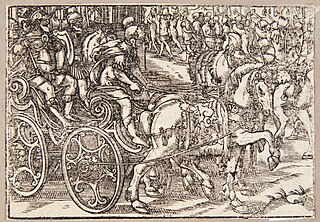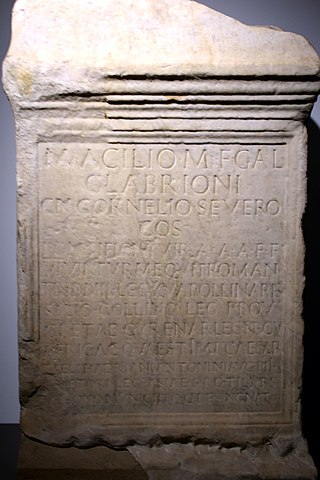Related Research Articles
Year 67 BC was a year of the pre-Julian Roman calendar. At the time it was known as the Year of the Consulship of Piso and Glabrio. The denomination 67 BC for this year has been used since the early medieval period, when the Anno Domini calendar era became the prevalent method in Europe for naming years.
Year 191 BC was a year of the pre-Julian Roman calendar. At the time it was known as the Year of the Consulship of Nasica and Glabrio. The denomination 191 BC for this year has been used since the early medieval period, when the Anno Domini calendar era became the prevalent method in Europe for naming years.
The gens Acilia was a plebeian family at ancient Rome, that flourished from the middle of the third century BC until at least the fifth century AD, a period of seven hundred years. The first of the gens to achieve prominence was Gaius Acilius, who was quaestor in 203 and tribune of the plebs in 197 BC.
Gaius Verres was a Roman magistrate, notorious for his misgovernment of Sicily. His extortion of local farmers and plundering of temples led to his prosecution by Cicero, whose accusations were so devastating that his defence advocate could only recommend that Verres should leave the country. Cicero's prosecution speeches were later published as the Verrines.
Manius Acilius Glabrio was a Roman statesman and general, grandson of the jurist Publius Mucius Scaevola.

Manius Acilius Glabrio was a plebeian Roman politician and general during the Republican. He served as consul in 191 BC while Rome was at war with the Seleucid Empire. He defeated Emperor Antiochus the Great at Thermopylae, helping establish Roman unipolar control over the Mediterranean, and was awarded a triumph. Credible accusations that he had embezzled spoils from his conquests in Greece while consul caused him to withdraw from his attempt to run for censor, after which he largely retired from public life.

The lex Manilia was a Roman law passed in 66 BC granting Pompey the military command in the East against Mithridates VI of Pontus.
Acilius Glabrio may refer to:
Manius Acilius Glabrio was a Roman Senator who served as consul ordinarius in AD 91 as the colleague of Trajan, afterwards emperor. Although one of many senators executed during the reign of Domitian on the alleged grounds of plotting against the emperor, he was remembered by his contemporaries best for his strength. Domitian summoned Glabrio during the latter's consulate to his Alban estate during the festival of the Juvenalia to kill a large lion; not only did Glabrio despatch the beast, but he escaped all injury. Following his defeat of the lion, Glabrio was banished by Domitian, then executed while in exile.
Manius Acilius Glabrio may refer to:
Appius Claudius Pulcher was a Roman politician of the 2nd century BC.
Manius was an uncommon Roman praenomen. It might have been derived from Latin word mane 'morning' and meant "born in the morning", but might also have been related to the manes, underworld deities sometimes associated with the souls of the dead, an association that could explain the limited use of the name.
Tiberius Sempronius Gracchus, a Roman republican consul in the year 238 BC, was the first man from his branch of the family to become consul.
Anicius Acilius Glabrio Faustus was an aristocrat of the later Roman Empire. He was Urban prefect three times before 437, consul in 438, and briefly Praetorian prefect of Italy in 442. Faustus was selected to promulgate the Theodosian Code in the Western Empire.
Marcus Acilius Glabrio was a Roman senator who was appointed consul suffectus in 33 BC.

The Temple of Piety was a Roman temple dedicated to the goddess Pietas, a deified personification of piety. It was erected in 181 BC at the northern end of the Forum Olitorium, the Roman vegetable market, and demolished in 44 BC to make room for the building eventually known as the Theater of Marcellus. It seems to have been rebuilt and its services continued well into the imperial period, although this is disputed by some scholars.

Manius Acilius Glabrio Gnaeus Cornelius Severus was a senator of the Roman Empire. He was consul ordinarius in 152 with Marcus Valerius Homullus as his colleague. Acilius Glabrio is known almost solely from surviving inscriptions.
Acilius Severus was a member of the Roman aristocracy of the fourth century AD. He is known to have been consul with Vettius Rufinus as his colleague, and to have served as urban prefect of Rome.
Tiberius Claudius Cleobulus was a Roman senator.